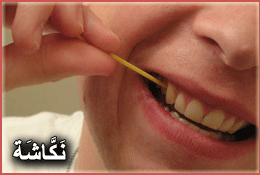-
Thanks guys for another perfect, useful lesson. :)
I just noticed that I can view the premium audio transcript without a premium account. Is that an error? -
@Kawzy, thanks very much for reporting the bug with the audio transcript being accessible to non-premium members. This has been fixed now. Hopefully those non-premium members who took advantage of this and kept it quite from us won't be too mad at you :-)
-
laa muskelah, Moshaya :).
-
بارك الله فيكم اجمعين
-
Interesting
-
salaam,
Is the word nakaasha fusha or 3amiyya? Also is it the most commonly used word?
I've asked in a couple of Arab restaurants and they've both said something like '3ooudh al-asnaan'.
-
And yesterday from another Arab person I was told sallaaka!
Although he wasnt sure whether it was fusha or 3amiyya -
Anyway not sure if you still read comments from 'old' lessons, but thanks for any clarification if you do.
-
Ahlan Zacheriya,
You can use (3ood asnan) certainly, this is also commonly used and it literally means (tooth stick). The phrases (nakkaashat asnan) and (3ood asnan) are correct and used in modern standard Arabic as well as colloquial Arabic.
Hope that helps. -
Thank you Ehab!
Beginner - Toothpick
| September 23rd, 2011 | 1 comment |
On your travels to the Middle East, or North Africa, you are bound to be treated to some Arab hospitality which generally involves some nice, tender, finger-licking meat! Having a toothpick is handy in those situations, so tune in and learn how to ask for one.
 MP3 Download MP3 Download
|
 PDF Transcript PDF Transcript |
 Audio Transcript Audio Transcript Exercise Exercise PLC PLC |
| Free | Basic | Premium |
|---|
Join the Discussion

Like this on facebook!

Random Word
مبكر |
|

Advertisement




For a modern European, the respectful titles offered in other countries take some getting used to eg I found being addressed as 'father' in Nepal a little embarrassing. I guess it's because, in the modern world youth is celebrated far more than age so it isn't comfortable to be addressed as if we're older than we are! It's probably our loss that we don't respect those who are older and, hopefully, wiser in our pursuit of the next new thing. There is an view that the Victorians invented a certain notion of childhood and commerce in the 50s & 60s went on to create teenagers to create a new market.